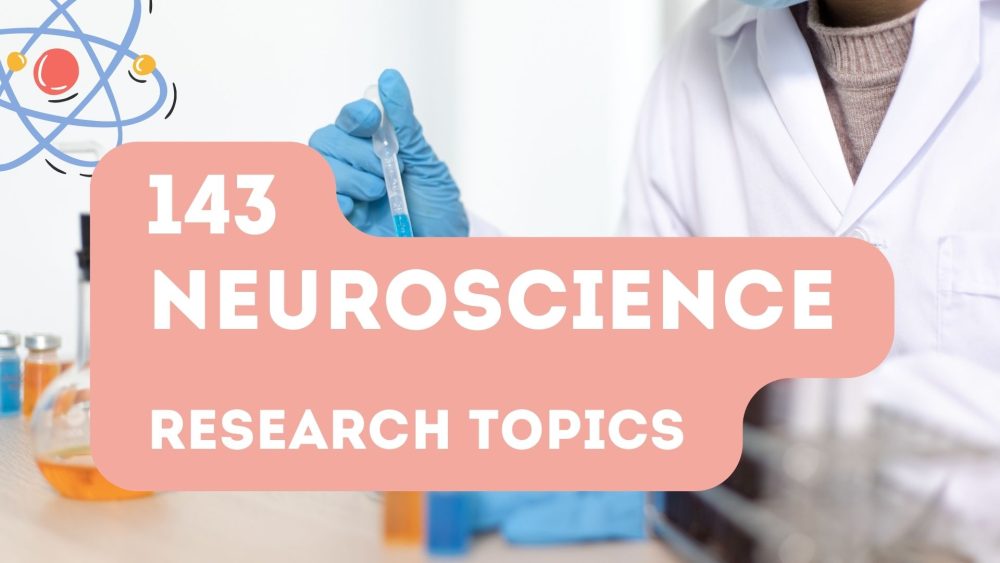143 Neuroscience Research Topics To Boost Your Grades

A neuroscientist’s primary focus is understanding how the brain works, and you need neuroscience research topics to create an impeccable paper to show your research abilities. If you’re interested in how the brain works, you must have questions you can only answer through experiments. But you must’ve passed all examinations before you can be fully certified to carry out any experiment. Writing a research paper is long and exhaustive, and you can be unmotivated. It’s why we’ve compiled a list of neuroscience topics to write about. But before a deep dive, what is neuroscience?
What is Neuroscience?
Neuroscience studies the functionality of the brain and nervous system. It encompasses the brain’s development, health, degeneration, and how it affects the whole body.
This subject also focuses on consciousness, memory, learning traits, and the concept of perception. It integrates sections including medicine, chemistry, linguistics, biology, and psychology in understanding how the human body functions.
Neuroscience Research: How to Structure Your Paper
One thing expert writers get right 99% of the time is the structure of their paper. A professional understands that a great outline helps track flow while maintaining high-quality articulation. Here’s how to structure your paper:
- Your Title Page: This is the first page the examiner sees. It entails the title of your research, the questions (or thesis), and the total word count of the paper. You should also include your identification number (although this may be your name if you’re in high school).
- Table of Content Page: This section is essential mainly for college students whose work needs to be navigable. It includes every heading and subheading in the paper alongside the page number. This makes it easy for your professor to jump to any page they’d like to read without hassle.
- Introduction: Your introduction is where you discuss what your essay is about. It focuses on the research idea and thesis and sets the tone for what you’ll discuss in the paper. In most cases, your introduction gives a background understanding of the topic you’ve chosen to discuss with your readers.
- Body: is where you place your arguments, back them up with facts, and arrange them orderly. You should first write your point, explain your meaning in a few paragraphs, and be conscious of the logic. Your arguments should be based on existing research (or quantity research which you independently sourced for). Whatever your sources are, the body is where you share your ideas and back them with relevant facts.
- Conclusion: This describes the paper’s content in fewer words. It explains what the paper is about, why it’s important and suggests future research suggestions.
- Your Reference List: This section is where you mention the source of every fact you cited in the paper. Referencing them means you recognize them as authors of the papers and the books you cited. Check with your faculty for the reference style guide recommended for your paper for this section.
A good structure keeps you ahead of the students who don’t understand simple outlines. Now that you know your paper’s typical outline, start your research with any of these cool neuroscience topics.
Neuroscience Topics
You already understand that neuroscience is piqued by the human brain, emotions, and memory and how they influence our behaviors. You can create an essay or paper based on existing research with newer insights on any of the following topics:
- The concept of behavioral science
- What are the common triggers of ADHD?
- Explain sensory neuroscience and how it contributes to understanding humans
- Write an epistle about the contribution of two neuroscientists to the field.
- Emotions and their influence on music
- Explain the connection between emotions and the justice system
- Sentiments and the role it plays in human relationships.
- Why is Alzheimer’s disease only understood to be for adults?
- Which trauma is responsible for chronic fatigue?
- What’s the psychological consequence of witnessing a gun crime?
- Explain the role of car toys in motivating locomotion in kids
- Explain how sugar and brain chemistry connects
- Connections of the brain with gut bacteria
- How cognitive neuroscience helps in psychological evaluations
- Addiction and why it’s a threat
- Does believing something doesn’t exist mean the entity — like depression — doesn’t exist to the believer? Explore the psychology of disbelief
- Discuss what degenerative brain disorder mean
- How much of a threat is Parkinson’s disease?
- The latest development on kids with autism
- Why are autistic kids talented?
Interesting Neuroscience Topics
Neuroscience isn’t a boring field, especially if you’re curious about how the human brain and emotions work. You can explore some of these excellent neuroscience topics regardless of your academic level:
- Factors leading to schizophrenia
- The impact of breathing on human memory
- Examine the neurodevelopmental stages of a child
- How the memory is organized
- Neuroplasticity in teaching and its significance
- Eye movement: how does it help with remembrance?
- The concept of computational neuroscience: efforts of tech on scientific research
- Difference between translational and clinical science
- The process of brain degeneration
- The biological explanation of how people fall in love
- The psychological consequence of a high IQ
- What’s the psychological state where an adult of 40 has the brain of a child of 6?
- The typical behavior of Alzheimer’s patients
- How does dopamine help the brain?
- Hormones responsible for the nervous systems
- Examine the connection between neurodevelopmental in early childhood for autistic kids
- Have gut bacteria also caused anxiety?
- Explain the consequence of ageing supplements on the human body
- Depression: What worsens the health of patients in treatment?
- Does exercise help reduce the pressure of depression?
Neurobiology Research Topics
Neurobiology is like saying neuroscience in another way. However, the slight difference is in its focus on anatomy, pathology, physiology, and the nervous system and how it scrutinizes several disorders. Here are some neurobiology topics to consider for your following paper:
- Examine the developmental stage of autism
- Discuss the traits of bipolar disorder
- Examine the difference between obsessive-compulsive disorder, and bipolar disorder
- Trace the origin of psychiatric disorders
- Explain the properties of neurons and their significance
- How does Eric Kandel describe consciousness?
- How does perception influence reality?
- What’s the role of behavior in how people understand the world?
- Do history and childhood influence an individual’s sense of justice?
- Childhood or adulthood experiences: which shape humans the more.
Neuroscience Research Topics for High School Students
You can also write some of the finest essays at this stage of your academic journey. However, you need research-based topics to achieve this. Consider writing in any of these:
- How do you reduce fears?
- Why do people fear known and unknown entities?
- Explain the concept of a self-wired brain
- What’s the psychological response to the American footballer’s injury?
- Brain injury: what complicates it?
- Treatment for PTSD?
- How do scientists know if a brain is functional?
- How can kids and teenagers prevent depression?
- What leads to depression in cats?
- The role of the brain in speech
- What is responsible for postpartum depression?
- Can drug addiction be controlled? What can control it?
- What’s the challenge that physical trauma poses to mental healing?
Neuropsychology Research Topics
Neuropsychology understands human behavior, cognitive power, and emotions while studying the brain’s function. It examines the network between these concepts to understand human life. Here are some neurology research topics in this subsection of neuroscience:
- The process of rehabilitation for patients with traumatic injuries
- Explain Huntington’s disease and common patient challenge
- Evaluate how clinical science approach treatment for schizophrenia
- How does the neuropsychologist explain love?
- How does the neuropsychologist understand depression?
- Explain the process of language rehabilitation
- Emotional shock: what it means through a case study of a patient
- What is the written language disorder, and how does it manifest?
- Discuss the role of neuropsychology in understanding human communication
- Explain how neuropsychologists explain emotions and affections
Neuroscience Research Topics 2023
Writing a research paper is easier when there are relevant topics to build your points on. Here are some easy and interesting topics that may contribute to future discoveries in the field:
- The symptoms of Alzheimer’s development stage in adults
- Shared traits of high IQ people and his to discover them
- How can the world maximize high IQ people?
- The consequences of worrying about the brain
- Parkinson’s disease: account for the impact on the brain
- How cannabis damages the brain
- What’s hallucination and hibernation: differences in the two terms
- How is ADHD treated?
- Evaluate the factors leading to memory loss and ageing and the differences between them
- How autistic patients are treated
Chemical Neuroscience Research Topics
Chemical neuroscience studies the complex levels and functions of different brain regions. It extends to understanding how the various cell types function in connection with individual ones. Here are the topics to fascinating topics to explore in the field:
- Provide the detailed process of clinically approved drugs
- Explain how brain-eating amoeba affect or influence the brain
- Describe the influence of N, N-Dimethyltryptamine on rat behavior
- Which side of the brain is responsible for anxiety and depression, and how are they classified?
- Explain the role of zebrafish in the discovery of antiseizure compounds
- How is Parkinson’s disease discovered?
- Discuss the role of nanoparticles in spotting the accumulation of ferritin in Alzheimer’s disease
- Is the brain or the heart responsible for affection and emotions?
- What are the latest trends in brain learning?
- How can machines learn to improve the versatility of the human brain?
Neuroscience Topics for Research Paper
If you’re a college or post-graduate student, you need a quality-based, research-founded paper. This may be a bit challenging because you may feel that every relevant topic has been discussed. Here’s a chance to explore the following neuroscience research paper topics with new insights. But if this is too much for you, you can always buy research paper online.
- PTSD: how it affects the brain
- How can a tumor growing in the brain without being discovered?
- Can autism in kids be controlled?
- Discuss the ill-advised many have gotten on handling head injuries
- Explain how scientists understand the brain capacity of people based on age
- Discuss what nerve stimulation is and how it works
- How does brainstorming fertilize the human brain?
- Explain how the brain interprets different musical tones
- Research to understand the fundamental factors leading to an interest in loud rock music
- What hormone do raindrop playlists activate for people trying to focus?
- What factors motivate sexual performance during sex, and why are they significant?
- Chronic fatigue and the human brain: Connection to sleeplessness
- Memory exercise: how does it work, and what are the results?
- How did scientists manage bipolar disorder 100 years ago and today?
- How has technology contributed to neuroscience?
- Discuss the relationship between dyslexia and autism
- How do scenic views amuse the brain?
- Reflect on the science behind planting chips in humans
- Explain the science behind auto-sensory gadgets for lame people
- An overview of the formation of depression in the brain and how humans can improve mental health.
Cognitive Neuroscience Research Topics
Cognitive neuroscience aims to understand how several biological signals to the brain influence cognition and reception. Here are some topics to explore:
- Why is perceived value considered real value in marketing?
- Hallucinations and brain deficit: discuss
- The difference in the experience of cognitive disorder in adults and kids
- Why do ADHD people not pay attention to details?
- Examine how the brain internalizes emotions with case studies
- Speech formation in children: discuss
- Learning: How do people with learning disabilities learn?
- Explain the wiring of the human brain
- Is the brain affected by excessive internet use?
- Consequences of opium on the brain.
Behavioral Neuroscience Research Topics
Behavioral neuroscience encompasses how biology influences psychological responses in the brain. It’s about human behavior and the pattern from it. Write on any of these topics:
- Case study of Louis Litt: How seeking Harvey’s affection in the movie Suits affected his lifestyle
- Explain what motivates the brain to request food
- Examine what drives sexual motivation in teenagers
- Discuss drug use and how it becomes an addiction
- How social encourage lousy behavior
- Andrew Tate: Is he a hero or a villain?
- What do you understand about the emotional part of the brain?
- What’s the relationship between dopamine and drug use?
- What’s the typical behavior of ADHD patients?
- What compels the illogical reaction of mental health patients during mental care?
Controversial Topics in Neuroscience
Neuroscience is a sensitive field which is why almost every subject is controversial. While scientists want to understand the human brain to improve its efficiency, there are questions about the ethics of its processes. Here are some topics you can consider writing on:
- Antidepressants: does it help or worsen patient health?
- Humans in lab research: what are the ethical issues?
- What’s the relationship between deep learning and the brain?
- COVID-19 isolation: a case study of the consequences on the brain
- Consequences of poor nutrition on the brain
- Dementia: Do exercises help?
- Perception: the role of physical objects for visually impaired people in creating memories
- Account for the activities of the most controversial scientists
- Discuss the concept of hereditary brain disorders
- Explain what neurodegenerative disease means.
Seek Help From Paper Writing Service
Now that you have 143 custom topics to explore, you only need to visit online and physical libraries for research materials. Remember that your essay needs thorough editing and proofreading to ensure it is high-quality and error-free. However, we understand how difficult writing a paper is, and it is expected that you may have more than once thought, “who could write my paper” and you might need some help. We offer expert paper writing help online to students from every academic level. We have expert writers with years of professional academic experience. They’re expert researchers, have an eye for grammar, and write fast, all for a low and affordable price. All you need to do is tell us what you want, and we’ll assign a writer whose experience matches your request. We’re available 24/7 online, and you don’t need to worry about excelling in class because it’s always what we achieve for students. Contact us with a “do my research paper now” request and we’ll get your papers done.













